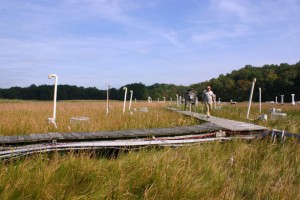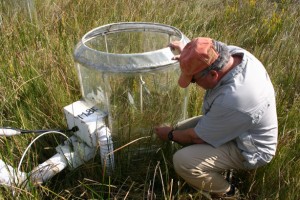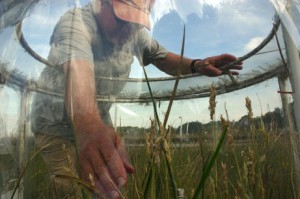If you’re looking for a good conversation about science, history or life – talk to Bert Drake. He’s a plant physiologist and renaissance man who’s been with the Smithsonian Environmental Research Center for nearly four decades. Drake retired in January, but will continue his investigations as an emeritus scientist. We caught up with him before he took well-deserved vacation.

Drake's research unfolds at the Kirkpatrick Marsh, located in Maryland on a subestuary of the Chesapeake Bay.
How did you earn a living before you became a scientist?
I was a drummer in a jazz band, a ski guide, the host of a jazz radio program and a high school science teacher.
How did you get drawn to the world of plant physiology?
Nature has always fascinated me and science is about discovering how nature works. I grew up in northern Maine. My father was a barber, but loved the outdoors. I was outside year-round: skiing, canoeing, trapping animals, fishing and taking photos. I knew I wanted to do something connected with biology. I became a science teacher, but it wasn’t until I attended a summer course in ecology that I wanted to get inside a lab and practice science.
In science you almost always get an approximation of an answer because an experiment is only an approximation of reality.
Much of your work has focused on understanding how plants will respond to rising levels of atmospheric CO2. In 1987 you began a field experiment at a marsh on the Chesapeake Bay that continues to this day. What are you trying to figure out?
The big question has always been whether or not plants and our land ecosystems would remain carbon sinks as atmospheric CO2 increases and the climate warms. We wanted to know if plants exposed to high CO2 in the field would keep growing and or if they would simply acclimate to higher CO2. Earlier studies had focused on greenhouse plants. Most concluded that the photosynthetic capacity of plants would decline after being exposed to elevated CO2. I thought that critical experiments had not been done. I wanted to get out into the field and study how an entire wetland would respond to higher levels of CO2.

Drake inspects one of his 'open-top chambers.' These allow him to control and monitor the amount of CO2 the wetland plants receive.
Immediately after we began the study in 1987 we found the plants were taking up more CO2. After 5-10 years the extra CO2 had big effects. We took this to mean that plants and wetland ecosystems could remain a carbon sink, even in a high CO2 world. After 20 years though, the plants’ response to more CO2 has become erratic. This makes interpretation of the results much more difficult. In science you almost always get an approximation of an answer because an experiment is only an approximation of reality.
What else has your experiment revealed?
Our work has shed light on the relationship between the carbon and water cycles. If we’ve come up with one painful piece of evidence, it’s that water is critical. That may seem obvious, but it’s important to understand in the context of climate change models. Some of these models predict more and longer droughts. Drought would reduce the productivity we’ve seen in plants that are given more CO2. Without water, these ecosystems can become carbon sources rather than sinks.

Drake conducts his elevated CO2 experiment on two different plants: the sedge Scirpus olneyi and the common marsh grass Spartina patens. They represent two different classes of plants - one that can increase photosynthesis with rising CO2 (S. olneyi) and one that cannot (S. patens).
What do most outsiders not understand about the art of practicing science?
When I taught high school science, I was required to present my students with a certain body of information. Science at that level was something to be memorized: plant names, their habitat and their range. This approach emphasizes what we know and not how we know it. Very little is taught about science as a process until graduate school. An exception to this is SERC’s intern program where we engage undergraduates in research projects.
I think it’s also difficult for outsiders to appreciate how much training it takes to become a scientist. Initially I thought all it involved was coming up with a hypothesis, making measurements and EUREKA! That is not how it works. You have to acquire an enormous amount of background knowledge in order to ask a question that makes sense and that can be answered.
What personality traits make for a good scientist?
Perhaps one of the most important characteristics of a scientist is curiosity. You can go along making measurements and cranking out publishable data sets, but you need to be curious about what the data are saying to you. You also have to be obsessive. Science is extraordinarily hard work. Being obsessive helps you endure it.
Find out more about Bert Drake’s work:
Watch an audio slideshow about his experiment.
Visit his lab’s Web page.
Listen to a lecture Drake gave at the Smithsonian’s online climate change conference for teachers.


Already in our place(India), we are experiencing very hot summer. Here the carbon dioxide percentage in air is very high. In some places in rural areas, drought like occurrences are common .